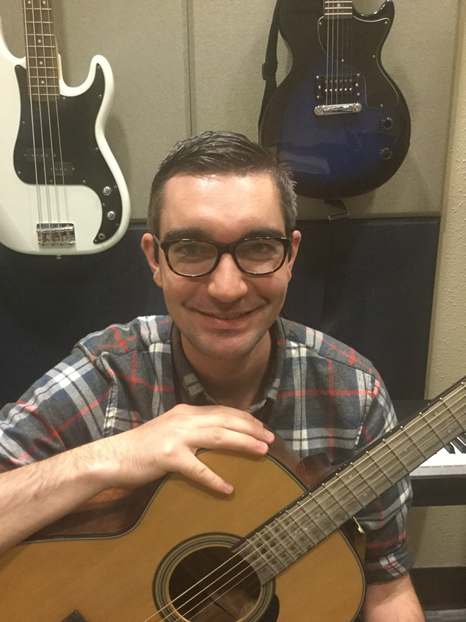Why (and how) you should get your child involved in music
As a music therapist, I am a fierce advocate for using music to enact positive change in peoples’ lives. Music can do amazing things, and being exposed to music at an early age can have significant advantages. I believe my parents’ decision to enroll me in piano lessons as a kid was something that helped enrich my life and guide me to my current career. Music is something many of us are exposed to daily, but we don’t always engage in music with the purpose of fully understanding it. Of course, it is important to be well informed about how you are exposing your child to music throughout their development in order to ensure the most benefit.
Debunking the myth of the “Mozart effect”
 You may have heard that if you play Mozart music for your child it will make them smarter. This is one of the most pervasive fallacies within the community of musicians, music researchers, music therapists, and anyone concerned with child development. There is no convincing evidence that playing Mozart for your child will affect their general intelligence. The “Mozart effect” was coined after a 1993 study that examined how people who listened to a musical piece by Mozart performed better on a specific mental task or puzzle. While many researchers have sought to replicate these findings, it is unclear if listening to Mozart can enhance general intelligence.
You may have heard that if you play Mozart music for your child it will make them smarter. This is one of the most pervasive fallacies within the community of musicians, music researchers, music therapists, and anyone concerned with child development. There is no convincing evidence that playing Mozart for your child will affect their general intelligence. The “Mozart effect” was coined after a 1993 study that examined how people who listened to a musical piece by Mozart performed better on a specific mental task or puzzle. While many researchers have sought to replicate these findings, it is unclear if listening to Mozart can enhance general intelligence.
Thanks in part to media misinformation and misguided parenting books, many were convinced that listening to Mozart makes you smarter. In fact, the governor in Georgia (Zell Miller) was so convinced Mozart would make children more intelligent that he sanctioned more than $100,000 of the state budget in 1998 to provide every baby born in Georgia with a CD of Mozart and required state-funded nurseries play classical music, despite the Mozart effect never being tested on infants. One common explanation for a short term boost in performance after listening to music is that engaging in enjoyable and stimulating activity can help prime your brain for concentrated thinking. Others have suggested that music is often processed in similar parts of the brain as spatial-reasoning.
While the Mozart effect doesn’t hold water, it does prompt an important question: What types of music exposure can potentially enhance intelligence?
How music impacts a child’s learning and development
While listening to music in short intervals has shown little effect on someone’s overall intelligence, taking the time to learn music can affect general intelligence in several domains. Some studies have shown that musically-trained children (learning an instrument and how to read music) are better at discriminating pitches and rhythm when compared to children with no musical training. This makes sense considering pitch and rhythm are inherent musical elements, so you might expect an enhanced ability to recognize them when musically trained.
Music learning is linked to improvements in non-musical domains as well. Children with musical training often demonstrate superior verbal memory and an advanced ability to learn languages as opposed to children with no musical training. Other studies have shown that children who took music lessons improved with higher IQs than children who took drama or art lessons over the same period of time.
Several studies have shown that musicians have unique brain structure when compared to non-musicians. For example, it has been reported that musicians often have a larger corpus callosum (a band of nerve fibers that connects the two hemispheres of the brain). Plus, people with extended musical training often have larger brain structures associated with processing sound (primary auditory cortex), executing fine and gross motor movements (primary motor cortex and cerebellum), and recognizing spatial orientation and processing short-term memory (superior parietal lobule). Research into the effects of musical training on the brain is ongoing, but it is clear that learning music can positively impact brain development in several areas.
Getting your child involved in music
Pursue private music lessons
 While private music lessons for your child is perhaps the most expensive way to get them involved in music, there are clear benefits to intense musical training. You may already be considering extracurricular activities for you child. When weighing your options, music training should be highly considered. Choosing an instrument is one of the first steps and can involve the input of your child if they express a preference. Some of the most common instruments to learn at a young age include piano, guitar, and violin. Researching the teachers in your area can be helpful. Creating a practice schedule for your child is integral to their musical training, perhaps requiring a minimum practice time a day that increases with age. You can start at 15 minutes a day for young children, and work up to an hour a day during teenage years.
While private music lessons for your child is perhaps the most expensive way to get them involved in music, there are clear benefits to intense musical training. You may already be considering extracurricular activities for you child. When weighing your options, music training should be highly considered. Choosing an instrument is one of the first steps and can involve the input of your child if they express a preference. Some of the most common instruments to learn at a young age include piano, guitar, and violin. Researching the teachers in your area can be helpful. Creating a practice schedule for your child is integral to their musical training, perhaps requiring a minimum practice time a day that increases with age. You can start at 15 minutes a day for young children, and work up to an hour a day during teenage years.
Look for opportunities in your local community
There are several low-budget options for getting your child involved in music. Central Florida Community Arts is an example of one community program that offers low-cost private music instruction, music camps, and several opportunities for children to participate in choirs and orchestras. In addition, many individuals who are active in their church or parish often have chances to learn music through choir participation.
Seek school-based programs
While many public schools do not offer opportunities for wind band, orchestra, or choir until middle school or high school, this can be a great way for your child to learn an instrument, learn how to read music, and learn how to function in a musical ensemble. Private lessons are often included in the school curriculum and take place during the school day. In addition, there are several options to borrow instruments from the school in order to make the experience affordable. Again, helping your child develop a practice schedule is integral to their success.
Learning music can have a great impact on your child’s intellectual development. Becoming proficient in music can require years of practice and instruction, but the rewards are worth the effort.
Ultimately, it is important to make music training fun and enjoyable for your child, while maintaining structure and considering the guidance of instructors.
Music Therapy is an important part of the Child Life, Music Therapy and the Arts Department at Arnold Palmer Hosptial for Children.
The Child Life team at Arnold Palmer Hospital is staffed by:
- Child Life Assistants
- Child Life Specialists
- Healing Arts Specialists
- Music Therapists
- Therapeutic Recreation Specialists







